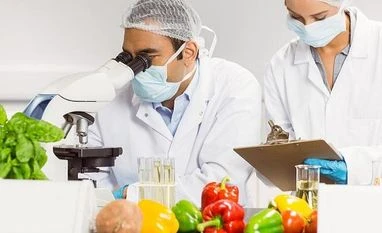Food regulator FSSAI on Monday said that over 1.06 lakh food samples were analysed last fiscal, of which 3.7 per cent were found to be unsafe and 15.8 per cent sub-standard.
The Food Safety and Standards Authority of India (FSSAI) reported 36 per cent rise in civil cases to 2,813 and 86 per cent increase in criminal cases to 18,550, it said in a statement.
There has been a 67 per cent increase in the number of cases where penalties were imposed to 12,727. A total amount of Rs 32.58 crore has been realised during 2018-19, up 23 per cent from previous year. There have been 701 convictions in criminal cases.
FSSAI released the data on enforcement efforts by states/UTs in the country. The released data includes samples analysed, non-conforming samples, cases launched, convictions and penalties by states/UTs during the year 2018-19
"During the year 2018-19, a total of 1,06,459 samples were analysed. While 3.7 pc of these samples were found to be unsafe, 15.8 pc were found to be sub-standard and 9 pc samples had labelling defects," FSSAI said in a statement.
There has been a 7 per cent increase in the number of samples analysed during 2018-19 as compared to 2017-18 and "25 per cent more samples were found non-conforming compared to the previous year", the regulator said, adding that this indicates there has been better targeting of enforcement efforts by states/UTs.
"More rigorous enforcement by states is essential to build public trust in food," FSSAI CEO Pawan Agarwal said.
More From This Section
He admitted that public trust has been eroded in recent times due to fake news, creating widespread perception of large-scale adulteration in the country.
FSSAI is working with states and UTs, particularly with weaker ones in this regard, he added.
"For this, FSSAI is increasing the capacity of state food laboratories and enabling use of private food labs for testing food samples. Enforcement efforts have to be better targeted and preceded by surveillance efforts to identify hotspots and problem areas," Agarwal said.
Uttar Pradesh, Gujarat, Kerala, Madhya Pradesh, Punjab, Tamil Nadu, Bihar, Jammu & Kashmir, Delhi and Chandigarh performed well, while states that have performed poorly include Chhattisgarh, Himachal Pradesh, Karnataka, Assam, Jharkhand, Odisha, Rajasthan, West Bengal, Telengana, and Uttarakhand.
Many of the poorly performing states have not been able to put in place full-time officers for food safety and do not have proper food testing laboratories despite the food safety law coming into force over a decade ago, FSSAI said.
)